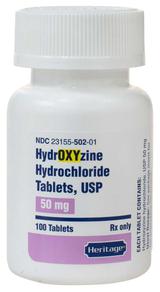Buy Generic Hydroxyzine HCl (Atarax, Vistaril) without vet prescription
Hydroxyzine HCl Generic (Atarax, Vistaril) 50mg Tablets
FREE Express Delivery to US
International shipping available,
pay by credit/debit card
![]() Ships from California
Ships from California
Click For Options and Pricing
(From $0.40 per tablet)
Hydroxyzine For Dogs: Uses, Dosage, And Side Effects
Hydroxyzine is an antihistamine that can treat dogs for allergic reactions, though it also has properties that treat nausea, anxiety, and other conditions.
In addition to blocking the effects of histamine in dogs’ bodies, this medication also depresses activity in the central nervous system, which gives the drug its sedative properties. The FDA has not approved it for veterinary use, but dogs can take it relatively safely with the approval and supervision of a veterinarian.
Hydroxyzine is primarily used for dogs to treat allergies and allergic reactions, such as those related to snake or insect bites and vaccines. The drug is an anti-inflammatory, which can open airways that are inflamed by allergic reaction, allowing dogs to breathe normally.
Vets can also prescribe it to treat inflamed, itchy skin from conditions such as dermatitis or alopecia.
Hydroxyzine has antiemitic properties that make it useful for reducing symptoms of nausea, and its ability to depress the central nervous system is helpful for controlling anxiety disorders and tension in stressful situations.
The following is a guideline for typical use of the drug in dogs and must not replace your veterinarian’s advice for your individual pet.
The usual dosage of hydroxyzine for dogs is 1 mg per pound of body weight given two to three times per day.
Dogs can take the medication orally, and they should follow the regimen until a vet advises that treatment should stop, even if the dog is showing signs of recovery from symptoms.
It should only be given to dogs with a prescription and veterinary supervision. Your vet may adjust the dosage based on your individual dog’s needs, so be sure to follow their guidelines strictly.
One of the main side effects of hydroxyzine in dogs is drowsiness, thanks to the medication’s sedative properties. If your dog seems overly drowsy or sedate, you should inform your veterinarian of the side effects so they can adjust treatment.
Here are some other side effects you may see in dogs who take hydroxyzine:
Loss of coordination
Vomiting
Lethargy
Weakness
Dry mouth
Increased thirst or urination
Trouble urinating
Loss of appetite
Diarrhea
Change in behavior
Excitability
Seizures
As with all medications, there is a risk of allergic reaction that can lead to anaphylaxis in dogs. If you see signs of an allergic reaction, then you should contact your vet immediately.
Dogs with glaucoma, high blood pressure, lung or heart disease, or an enlarged prostate shouldn’t take hydroxyzine. Dogs with urinary or intestinal obstruction may also have complications. Pregnant or nursing dogs should not take the drug, either.
Make sure your vet is aware of all medical conditions your dog has, as well as any other medications your dog may be taking, as these can react poorly with hydroxyzine. This is especially true with epinephrine or other drugs that depress the central nervous system or cause sedation.
Talk to your vet about any side effects you see that cause you concern because your vet may be able to adjust the dosage or form a different treatment plan.
- Home
- Antibiotics*
- Anti-Inflam, Pain, Anxiety#
- Flea, Heartworm &Parasites^
- Eye & Ear%
- Thyroid, Heart&
- Other@
- Contact / FAQ
- Human Medications
Click any product name on Home Page to find how to order it
Email:
dogandcatpharm.com@gmail.com
© 2017-2025 by Dog and Cat Pharm LLC


